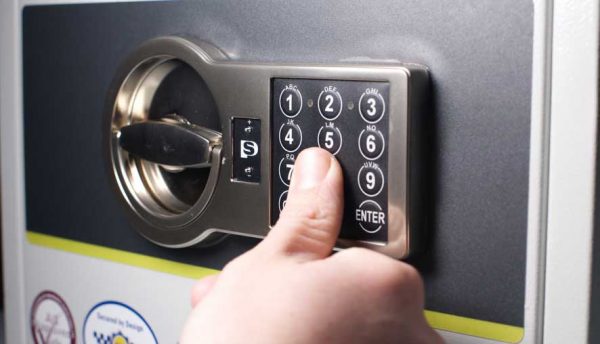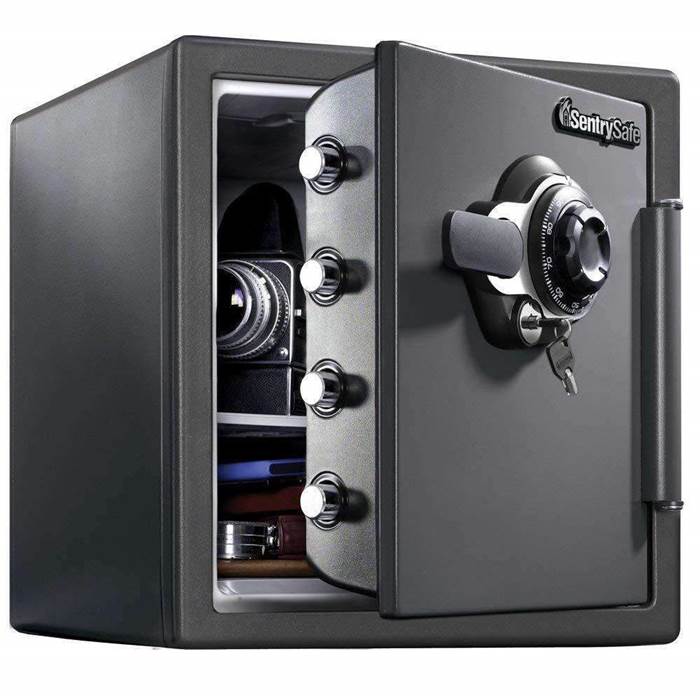Home security is a major concern for almost all of us, especially when we have prized possessions at our place.
Sure, you can go for security cameras and all possible measures but keeping a home security safe is always a better choice.
What’s home security safe? It’s just a usual safe that you see in banks, but it is at home. You can keep your jewels or cash or important papers in there.
Having security safes helps you in cases where even with burglaries, you are on the safer side. Do you wanna know more about it? Let’s get started.
Home Security Safe
I have been using security safes for years to keep my possessions protected and near. You may wonder why I do that when I have a bank account to keep my valuables safe. Well, the safes are here for a reason.
Do you know where these security safes came from?
The history of these security safes goes back to ancient Egypt. The oldest ones were discovered in the tombs of Pharaoh Ramesses II, dating from the 13th century BC.
The first was a hardwood safe with a sealing mechanism similar to pin locks used presently. It was a remarkable achievement, especially considering that it was a 3000+-year-old invention.
As years progressed, security safes developed as well. The first advanced safe is thought to have been designed by William Marr, a British engineer.
During the mid-nineteenth century, the Uk outpaced the rest of the world to create safes, inventing a slew of novel designs, and here we are today.
Security safes are not one-size-fits-all types, and they come in different sizes to suit your need.
Types of Security Safes
You should be familiar with the various types of safes available before installing one in your business or home. The safe you select is as per your requirements.
For storing critical documents, a business might require a depository safe or a larger commercial safe.
A multi-compartment safe can be independently locked, giving various staff distinct levels of access.
You can have a variety of residential safes to choose from, but for home security safes, you’ll have these options:
- Gun Safes (to keep weapons safe and hidden)
- Burglary Safes (Securer than all others with fire resistance)
- Jewelry Safes (Locks for your jewels)
- Fire Safes ( not much secure but fireproof)
- Floor Safes (freestanding)
- Wall Safes (Concreted safes)
Each safe serves its purpose. Besides, you don’t have to take one big safe that’s difficult to hide. Instead, you can dedicate each safe to a particular category and be at peace.
Now that we know the types, why do people use these safes anyway? Are there any benefits besides hiding your stuff?
Top 2 Reasons to Use a Home Security Safe
2 in 1- Safety and Storage
My objective for installing safes in my house was to ensure the protection and reliability of the valuables. A safe helps you to store your stuff in a safe facility. Even if you live in a good area or neighborhood, it gives assurance.
Another explanation is that most times, there isn’t enough storage capacity in our cupboard drawers, or they are easily accessible to anyone.
I mean, yes, you can have your passport safe without keeping it in a safe, but it’s far easier to remember where you put it than to race around the home looking in every drawer immediately before going for the flight.
A vault can be used to protect sensitive belongings in one handy area while keeping them private from the rest of the house. Plus, you know where they are without a last-minute hassle.
Security Against Flames and Flooding
A plus point about safes is that they protect your belongings against fire and water leaks.
Fires can ignite homes for various reasons, including defective electrical wiring, food forgotten on the stove, and improper usage of heating systems.
When a fire breaks out, its flames can rip through your house in a fraction of a second, and all you can do is ensure that your valuables, including your family, are safe.
Perhaps your house floods from the rain from a winter storm, a hurricane, or a pipe breakage. The water-resistance quality of a safe will protect you there as well.
In such serious situations, documents are probably not at the top of your priority list at that time. That’s when the security safe that you installed in your place will safeguard it for you.
Security Box for Home

With the types and reasons defined, we now come to the security box. If you think you don’t need a security safe at this point, you can go for a security box.
Are a security safe and a security box the same? Either of these aims for your safety. What’s different is a security box can be fit into your already existing cupboard. It’s like a safe drawer.
Generally, the security boxes are at banks to secure their customer’s belonging. They rent customers a security box and have keys or fingerprint scanners to unlock the boxes.
But, it has become common for people who don’t trust banks or digital asset allocation. They can buy it from Amazon. A security box has all the home safety features, but it’s space-efficient and affordable.
Here’s What to Store in Security Box
First things first, a security box is smaller than a safe, so you can’t store heavy jewelry or bundles of documents there. But of course, the size is customizable.
So, what can you store in a security box? Store something that you don’t need regularly, but it’s extremely important to you. For instance, you can keep your birth, marriage, and employment certificates.
Do you need more suggestions? I present you with this list.
- Personal paperwork.
- Wills and powers of attorney copies (but not the only ones)
- Discharge papers and military documents (e.g., DD 214s)
- Transcripts and diplomas from the school.
- Documents that you don’t want your roommates, kids, friends, or guests to see.
- The ownership of your home, as well as any car licenses.
- Paper equities and bonds certificates, including US savings bonds (though most are now issued online).
- Contracts.
- Critical business paperwork and records.
- Backup copies and vital data are stored on hard drives and flash drives.
- Jewelry, antiques, and family heirlooms that are both financially and emotionally valuable
- Other minor items or documents that are difficult or impossible to restore.
You can use your security box at home with the certainty that your documents are safe, but I’d still advise you to keep the most sensitive papers in a zipped bag.
It will work as another security gate in case of water exposure. You can strengthen the safety chances by placing the box wisely.
Places to Keep a Security Box
There is no all-purpose, specific location that’s ideal for every house. But, I can suggest several locations where you can place your security box safely to protect assets from burglary, fire, and flooding.
Scenario 1: Home Invasion
Look for a spot in the house that is off-center or difficult to find. It should be hidden and integrated into the house’s construction. I recommend storing your security box in a coat closet or the closet of a guest bedroom.
If we look at it another way, you can have a security box concealed in the wall, behind a door that matches the closet, or in a cabinet.
Scenario 2: Fire Emergency
The second most serious threat to your house is fire. In this case, the most secure location for a security box would be at the intersection of two exterior walls. For a heavy safe, this provides maximum protection and support.
It’s advisable to store the safe on the ground floor in a house with numerous stories. If your home or apartment has an emergency system, it’s also a good idea to put it within the sprinkler range.
Scenario 4: Water Leaks or Flooding
Ensure your safe is situated above ground level to prevent your belongings from being destroyed or lost in flood. It’s a good idea to build a steel or concrete base to support safety in flood-prone areas.
DO NOT KEEP SAFES IN BEDROOMS OR GARAGES
Experts always recommend choosing a spot that is not in the main room. This is frequently one of the first locations burglars search for hidden safes or security boxes.
The garages are generally the least secure part of the house regarding robbery, fire, flooding, and other misfortunes.
Conclusion
As we conclude, I want to ask if you’ve ever thought of installing a safety box in your house. It’s like mysterious movies where burglars look right, left, and center for treasure and can’t find it. Isn’t it?
Well, today people prefer banks and other sources to keep their belongings safe, but I believe it’s always better to have a secure space in your own house.
To make sure your surrounding is safe, you can use smart technology as well. Comment and tell me if you’ve learned anything new from this post. I am waiting!
Learn more about Home Security
